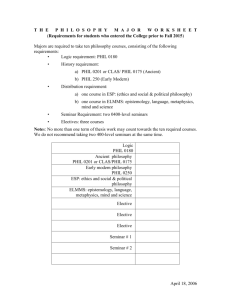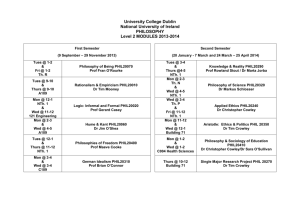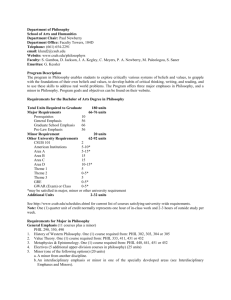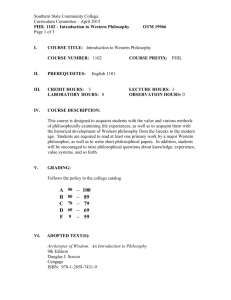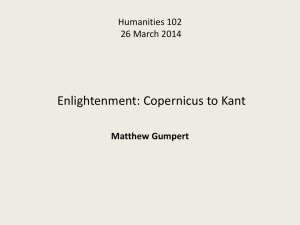Level 2 MODULES 2012-2013 - University College Dublin
advertisement
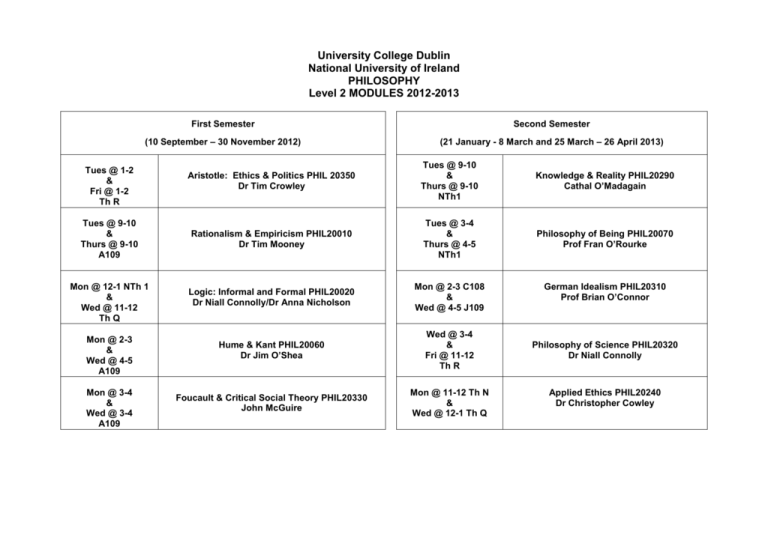
University College Dublin National University of Ireland PHILOSOPHY Level 2 MODULES 2012-2013 First Semester Second Semester (10 September – 30 November 2012) (21 January - 8 March and 25 March – 26 April 2013) Tues @ 1-2 & Fri @ 1-2 Th R Tues @ 9-10 & Thurs @ 9-10 A109 Mon @ 12-1 NTh 1 & Wed @ 11-12 Th Q Mon @ 2-3 & Wed @ 4-5 A109 Mon @ 3-4 & Wed @ 3-4 A109 Aristotle: Ethics & Politics PHIL 20350 Dr Tim Crowley Tues @ 9-10 & Thurs @ 9-10 NTh1 Knowledge & Reality PHIL20290 Cathal O’Madagain Rationalism & Empiricism PHIL20010 Dr Tim Mooney Tues @ 3-4 & Thurs @ 4-5 NTh1 Philosophy of Being PHIL20070 Prof Fran O’Rourke Logic: Informal and Formal PHIL20020 Dr Niall Connolly/Dr Anna Nicholson Mon @ 2-3 C108 & Wed @ 4-5 J109 Hume & Kant PHIL20060 Dr Jim O’Shea Wed @ 3-4 & Fri @ 11-12 Th R Foucault & Critical Social Theory PHIL20330 John McGuire Mon @ 11-12 Th N & Wed @ 12-1 Th Q German Idealism PHIL20310 Prof Brian O’Connor Philosophy of Science PHIL20320 Dr Niall Connolly Applied Ethics PHIL20240 Dr Christopher Cowley Level Two Module Outlines 2012-13 SEMESTER ONE Aristotle: Ethics and Politics PHIL 20350 Aristotle conceives ethics and politics as falling under the same branch of knowledge, namely political science. His works i n this area, the 'Nicomachean Ethics', and the 'Politics', are masterpieces of philosophy, and remain of great interest and influence today. In this module we will examine the key doctrines that Aristotle argues for in these seminal texts. Topics to be discussed include: the virtues; justice; the significance of practical reasoning; the problem of weakness of the will; the question of pleasure; the importance of friendship; the nature of citizenship; the ideal state; education in the ideal state; and the meaning of happiness. To set Aristotle's work in its appropriate historical and philosophical context, we will also look closely at the treatment of these, and similar, topics by Aristotle's great predecessors, Socrates and Plato. We shall also consider the influence of Aristotle's approach on modern moral and political philosophy. Rationalism and Empiricism PHIL 20010 How do modern treatments of substance and causality differ from what came before? Do we require certain knowledge, or is probable knowledge enough? Do we really need to go outside nature to explain nature? Are there such things as innate ideas, or is the mind at its beginning a 'blank slate' awaiting sense impressions from outside? Does my identity lie in the unconscious, or in conscious experiences I can call my own, or both? In this course we will explore these questions, and others, by lookin g at the contrasting ideas and arguments put forward in the great philosophical traditions of Rationalism and Empiricism. Following a brief consideration of Descartes' later work, the philosophers to be examined in most detail will be Spinoza, Locke, Berkeley and Leibniz. Logic: Informal and Formal PHIL 20020 Logic is a study of the central notions of argument and inference. The module begins with an treatment of Traditional or Aristotelian Logic, continues with a brief analysis of argumentation in everyday informal contexts and moves on to consider the construction and evaluation of argument in modern formal contexts. Notes will be supplied for the Formal Logic section of the Module and these will be made available on Blackboard. Schematic notes on Rhetoric will also be made available to students on Blackboard. Anthony Weston's "A Rulebook for Arguments" is required reading and should be available for purchase from the College Bookshop. It is recommended that students read some supplementary material on informal logic, such as Madsen Pirie's "How to Win Every Argument" or Jay Heinrichs's "Thank Your for Arguing". Level Two Module Outlines 2012-13 Hume & Kant PHIL 20060 In this course we will study selected writings from two of the most important philosophers of the Eighteenth century Enlightenment period: David Hume and Immanuel Kant, with particular focus on Kant's _Critique of Pure Reason_. Topics will include scepticism and the nature of knowledge and belief; consciousness and the nature of the self; perception, identity, an d causality. Hume's empiricist and sceptical naturalist outlook was famously opposed by the 'transcendental idealism' of Kant. Descendants of Humean and Kantian views are very influential in disputes today across the spectrum from metaphysics and epistemology to aesthetics, morality, and political philosophy, so this course will provide important background for many of our level three courses. (Students should be aware that Kant's writing in particular is somewhat technical and would be best approached by students who have already completed one or more philosophy modules.) Foucault & Critical Social Theory PHIL 20330 The course will deal with the work of Michael Foucault as a contribution to critical social theory. Foucault's genealogical approach to power has raised fundamental challenges and questions for social philosophy and critical social theory. This course provides a comprehensive study of Foucault's analyses of power and subject-formation through a reading of some of his genealogical studies, considering the implications of his work for the project of critical social theory. The course will primarily consider Foucault's major texts, Discipline and Punish, and The History of Sexuality: Volume 1, as well as later wo rk on the subject and power, and selected interviews and lectures. We will also examine influences on and critical interpretations of Foucault's work, and consider the ways in which his work has informed contemporary critical social theory. Level Two Module Outlines 2012-13 SEMESTER TWO Knowledge and Reality PHIL 20290 This course examines central philosophical issues in epistemology and metaphysics, or knowledge and reality. What is the nature of our knowledge of the world? Is our knowledge grounded primarily in sense experiences, or in reason (intellect)? What is knowledge, that is, how should that concept e defined or analysed? What are the limits of knowledge? How might we address sceptical challenges to the very possibility of knowledge in general or of various kinds (knowledge of self or of the 'external world', inductive knowledge, and so on)? On the side of reality, what are the fundamental kinds of things (substances, beings) that we know to exist in the world? Metaphysics is the rational investigation of the most general featu res of reality and of the human being: what is it to be a self, or a mind, or to have free will (if we do)? What is time? What are concepts and universals? How are language and thought related to one another? What is it to be the 'same' thing through change? These are the sorts of questions that are typically examined in this course, with the particular focus varying each year (to be clarified at the start of the module). Philosophy of Being PHIL 20070 A systematic discussion of fundamental themes in metaphysics, based on selected texts from Parmenides, Plato, Aristotle, Aquinas, Hegel, and Heidegger. Topics will include: Nature and purpose of metaphysics. Metaphysical nature of human existence. Question of being. Validity of metaphysical knowledge. Philosophy as search for unity. Affirmation of existence. Principles of being/laws of thought. Concept of being (Parmenides: Being is, Nonbeing is unintelligible. Hegel: Being and Nothing are identical). Unity and diversity of existence. Analogy: metaphor as illustrative of the universal affinity of beings. Plato's theory of being. Aristotle's search for substance. Aquinas' distinction between essence and existence. Existence of G od. Theory of Evolution. Causality, freedom and personhood. German Idealism PHIL 20310 The period of European philosophy designated as German Idealism witnessed an upsurge of theoretical innovations. The main philosophers of this movement -- Kant, Fichte, Schelling and Hegel -- redrew the theories of just about every topic they considered: selfhood, freedom, the state, beauty and art, history, nature and science, and religion. They left behind a legacy of concepts which continue to shape the contemporary world: e.g. autonomy, dialectic, aesthetic judgment, recognition and Level Two Module Outlines 2012-13 universal history. This module will, through close textual readings, consider the contentions and arguments of these philosophers on a selected range of from each of these topics. Philosophy of Science PHIL 20320 This course will subject the aims and methods of science to philosophical analysis; the basic question we want to answer is: what is science? We will start by asking whether scientific theories and the practice of science have distinctive features wh ich allow us to draw a clear distinction between science and other human enterprises. It has been felt that a 'demarcation criterion' is particularly important for disqualifying as real science, 'pseudo-science' like Creationism and Homeopathy. We will examine some alleged demarcation criteria. It is difficult to come up with a demarcation criterion or an exact definition of science but there are some things that are clearly true of science: science seeks to explain natural events, and to formulate laws of nature. We will ask what it is to explain a natural event; and what is a law of nature? W e will also investigate the general aim of science. Does science attempt to give a true account of the world; or just a useful or 'empirically adequate account? A related question is whether scientific theories are committed to the existence of the unobser vable entities they posit. Science, it is often claimed, aims for an objective view of the world and this aim is facilitated by its methods. Femi nist philosophers of science have subjected the notion of objectivity and the claim that science is objective t o critical scrutiny; we will examine this critique. Applied Ethics PHIL 20240 This module will comprise a detailed examination of the concepts of love and friendship. We will start by comparing the different objects of love: romantic partners, parents and kids, pets and cars, football teams and countries, justice and God. We will then ask about the relationship between feelings and action: is love no more than a random feeling to which one passively succumbs? Can love be sincere but nevertheless mistaken? What is the relationship between duty and love? Can love justify immorality? Is there such a thing as unconditional love? Should schools encourage their pupils to love their country? In terms of friendship, we will ask the following questions: are there objective rules for friendship? Can friendship survive great inequality? Are there any good reasons for betraying a friend? Single Major Research Project PHIL 20270 The Undergraduate Research Project offers second year Philosophy students the opportunity of working under the close supervision of a member of staff to produce a sustained in-depth piece of work (5,000 word max.). Successful completion of Level Two Module Outlines 2012-13 the project will require a significant degree of self-discipline and self-motivation, as it demands much independent research and study. Students are free to pursue a philosophical topic of their choice, on condition that the module co -ordinator considers the topic viable, and there is a member of staff who is able and willing to act as supervisor. Students shoul d therefore begin to think about and prepare their proposals as soon as possible in the first semester. The project is due at t he end of the eight week of the second semester.

